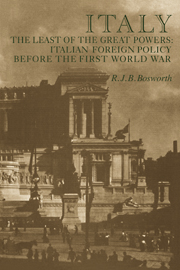Book contents
- Frontmatter
- Contents
- Dedication
- Preface
- List of maps
- 1 Society and politics in Liberal Italy
- 2 New political pressure groups and foreign policy
- 3 The making of a Foreign Minister: Antonino Di San Giuliano
- 4 The Consulta: the bureaucrats of foreign policy
- 5 How Italy went to Libya
- 6 How Italy stayed in Libya
- 7 The politics of alliance: Italy in the Triple Alliance, 1912–1914
- 8 The politics of friendship: Italy, the Triple Entente, and the search for a new Mediterranean agreement, 1911–1914
- 9 ‘Un cliente maleducato’: Italy in the Dodecanese and Ethiopia, 1912–1914
- 10 Preparing to digest some spoils: Italian policy towards Turkey, 1912–1914
- 11 San Giuliano's epilogue. The realities of European war 28 June to 16 October 1914
- Conclusion
- Appendix I The Ten Commandments for Italians abroad
- Appendix II Pro-memoria on our politico-military situation, by A. Pollio
- Appendix III San Giuliano's poem about his funeral ceremony
- Abbreviations used in the notes and bibliography
- Select bibliography
- Notes
- Index
Preface
Published online by Cambridge University Press: 16 November 2009
- Frontmatter
- Contents
- Dedication
- Preface
- List of maps
- 1 Society and politics in Liberal Italy
- 2 New political pressure groups and foreign policy
- 3 The making of a Foreign Minister: Antonino Di San Giuliano
- 4 The Consulta: the bureaucrats of foreign policy
- 5 How Italy went to Libya
- 6 How Italy stayed in Libya
- 7 The politics of alliance: Italy in the Triple Alliance, 1912–1914
- 8 The politics of friendship: Italy, the Triple Entente, and the search for a new Mediterranean agreement, 1911–1914
- 9 ‘Un cliente maleducato’: Italy in the Dodecanese and Ethiopia, 1912–1914
- 10 Preparing to digest some spoils: Italian policy towards Turkey, 1912–1914
- 11 San Giuliano's epilogue. The realities of European war 28 June to 16 October 1914
- Conclusion
- Appendix I The Ten Commandments for Italians abroad
- Appendix II Pro-memoria on our politico-military situation, by A. Pollio
- Appendix III San Giuliano's poem about his funeral ceremony
- Abbreviations used in the notes and bibliography
- Select bibliography
- Notes
- Index
Summary
On 10 June 1940 Benito Mussolini appeared on the balcony of the Palazzo Venezia and declaimed to the marshalled throngs below that ‘destiny’ was sounding out the hour for Italy to enter the Second World War. As Greece, North Africa, and finally the islands and peninsula of Italy itself would soon testify, what the Duce was really heralding was the end of Italy's role as a Great Power.
In domestic matters, after 1945, the wind from the north may have been diverted; Christian Democratic Italy may owe a large legacy to the Fascist or Liberal past. But the fiasco of Fascist military effort and the changed international balance after the war destroyed at a blow the imperial pretensions, the assertions of greatness made for almost a century by the intellectuals, industrialists and politicians of the ‘Third Italy’, the ‘resurgent’ Rome.
No doubt there is a distinct break in continuity between the foreign policy of Fascist Italy and its successors. Is there a similar break between fascism and its predecessor, the Liberal regime which governed Italy from 1860 to 1922? The greatest of Liberal historians, Benedetto Croce, of course declared that fascism was a ‘parenthesis’, and that Mussolini's regime was different in kind from that of Giolitti or of other Liberal leaders. Croce's theories have often met with withering criticism in so far as concerns Italy's domestic affairs. In foreign policy, oddly, the concept of parenthesis has retained more support. For example the two most notable recent English-language studies of Fascist foreign policy argue respectively that in the nineteen-twenties Fascist foreign policy was new, aggressive and totalitarian and that in the nineteen-thirties Italy was dragged into ‘Mussolini's wars’.
- Type
- Chapter
- Information
- Italy the Least of the Great PowersItalian Foreign Policy Before the First World War, pp. vii - ixPublisher: Cambridge University PressPrint publication year: 1979

